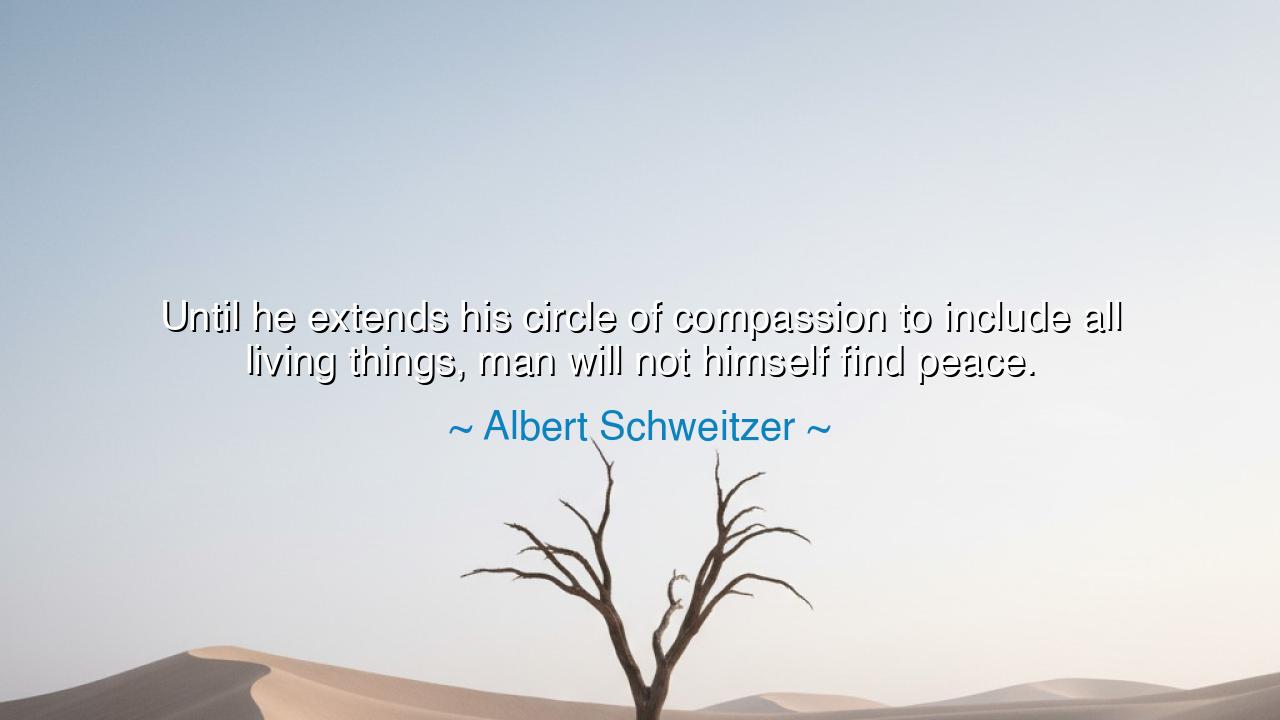
Until he extends his circle of compassion to include all living
Until he extends his circle of compassion to include all living things, man will not himself find peace.






The words of Albert Schweitzer—“Until he extends his circle of compassion to include all living things, man will not himself find peace”—echo like the voice of a prophet crying in the wilderness. They remind us that the harmony of mankind is not secured by wealth, power, or even knowledge, but by compassion—that deep and selfless love which flows outward, embracing not only family and tribe, not only nation and race, but all creatures who share breath beneath the sun. Schweitzer, physician, philosopher, and servant of the poor, speaks here not of sentiment, but of a law woven into the fabric of existence: that only when man ceases to destroy and exploit without conscience, will he taste true peace within himself.
The origin of this teaching rests in Schweitzer’s own life. Leaving behind the comfort of Europe, he journeyed to Africa to heal bodies and souls alike. There, in the forests and villages of Lambaréné, he witnessed the interconnectedness of all life. He saw that cruelty to animals, exploitation of nature, and disregard for the weak always returned as suffering to mankind. Out of these reflections was born his great principle of “Reverence for Life.” His quote is the flowering of this vision: to exclude any part of creation from our circle of compassion is to wound ourselves, for all life is bound together in one tapestry.
History itself bears witness to this truth. Consider the Dust Bowl of the 1930s in America, when greed and neglect stripped the land of its soil. Farmers, blind to the delicate balance of nature, plowed without restraint, killing the grasses that held the earth together. The winds rose, the land cracked, and hunger spread across the nation. Man’s lack of compassion for the earth’s living systems became his own punishment. Only when practices changed, when the soil and land were treated with respect, did restoration begin. This is Schweitzer’s teaching made visible: by failing to extend compassion to living things, mankind destroys his own peace.
Yet Schweitzer’s words reach deeper still—they pierce into the realm of the heart. For how can a man who delights in the suffering of animals, or who tramples upon the weak, ever know serenity within? His conscience, though perhaps buried, remains restless. Violence outward breeds turmoil inward. Hatred without becomes poison within. But when compassion flows like a river through the soul—embracing the bird in the sky, the beast of the field, the stranger in the street—then the heart becomes a sanctuary of peace. Compassion is not weakness; it is strength clothed in gentleness, the very key to inner harmony.
The ancients too knew this truth. The Buddha taught ahimsa—non-harm—as the path to liberation. Saint Francis of Assisi called even the sparrow and the wolf his brothers. These great souls understood what Schweitzer later proclaimed: that to live in union with creation is to live in peace, but to live as its tyrant is to dwell in perpetual war with oneself. The circle of compassion must ever widen, until it holds all who live, else it remains broken and incomplete.
The lesson for us is plain: expand your compassion. Do not confine it to your family alone, or to those who think as you do. Extend it to the stranger, the powerless, the animal, even to the earth itself. Each act of compassion enlarges your soul and draws you nearer to the still waters of inner peace. Each act of cruelty shrinks the spirit and darkens the path. As long as man limits his compassion, he limits his own freedom, chaining himself to unrest.
Practically, let us live this teaching in small but faithful ways. Show kindness to animals; treat them not as objects, but as companions in life’s journey. Care for the land; do not waste, for the earth itself is alive. Defend the weak; stand for justice where others trample upon it. And above all, examine your own heart—ask daily, “Whom have I excluded from my compassion?” and then, enlarge the circle.
Thus, the wisdom of Albert Schweitzer endures across generations like a lamp burning steadily in the night: “Until he extends his circle of compassion to include all living things, man will not himself find peace.” Let these words be carved upon our memory, that we may learn to live not as conquerors of the earth, but as caretakers of its life. For only then will our restless souls be calmed, and only then will humanity taste the sweetness of true and lasting peace.






AAdministratorAdministrator
Welcome, honored guests. Please leave a comment, we will respond soon